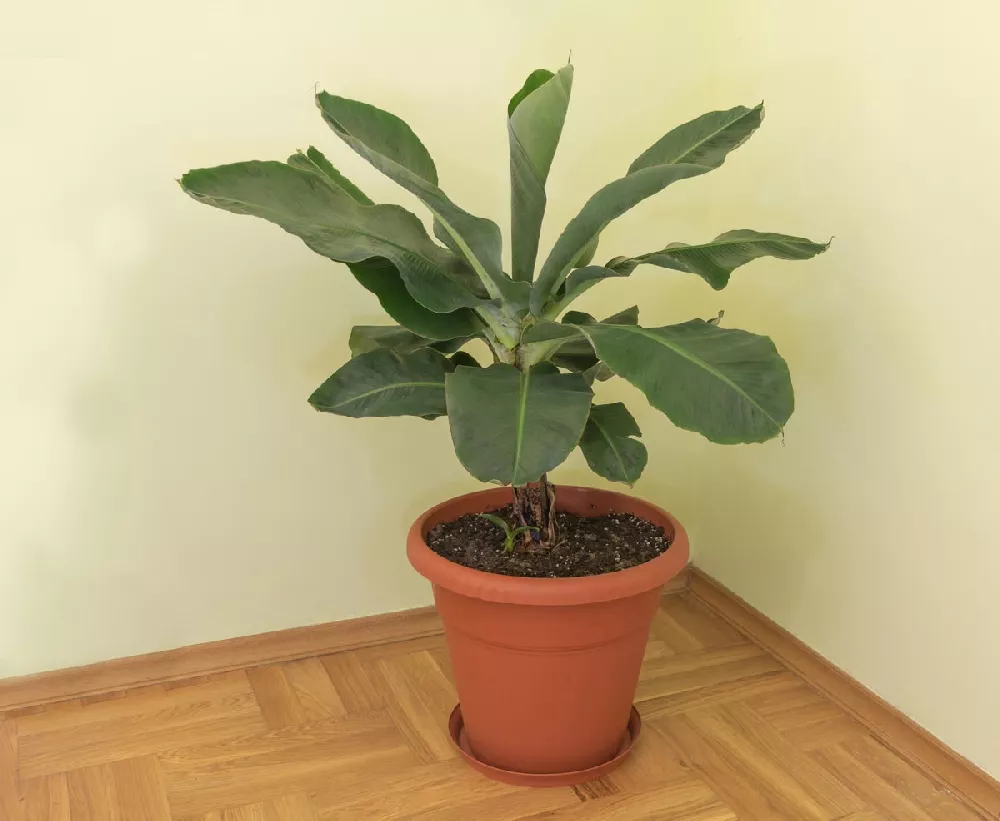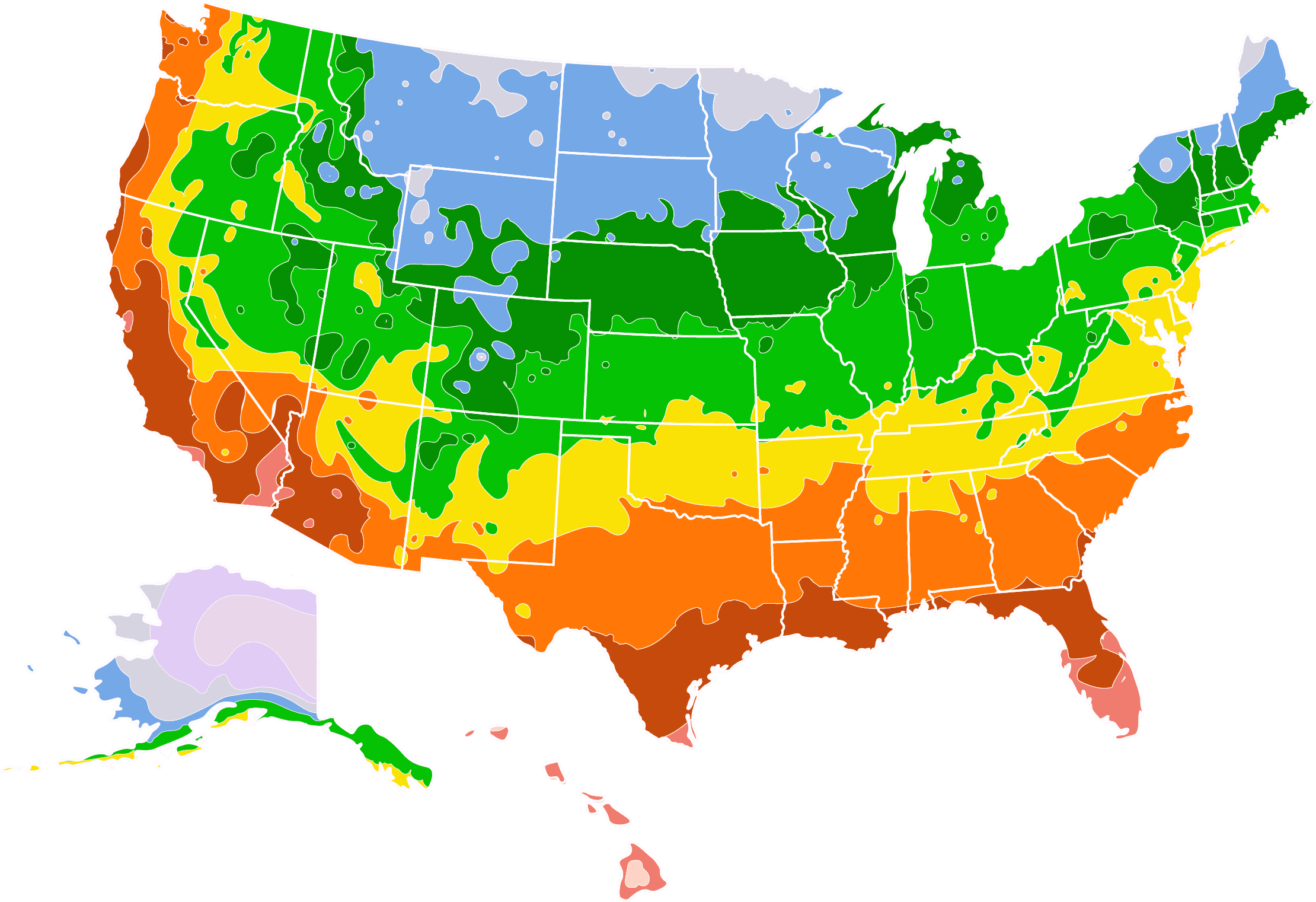- Home >
- Edible Plants >
- Dwarf Cavendish Banana Trees
Dwarf Cavendish Banana Trees for Sale
- Ships in 1-2 days
- 1-Year Warranty Eligible
- Pots or accessories are not included unless specified in the product options.
Shipping Details:
Once your order is shipped, you’ll receive an email with a tracking number and estimated delivery date. Most orders ship immediately, but some items are seasonal and may only ship in spring or fall. These products are noted on the website.
Dwarf Cavendish banana trees are a fantastic addition to any garden that has a tropical style. This plant grows to moderate size of no more than 10 feet, but it has remarkably large leaves that stretch several feet on their own. This cultivar, which goes by the name Musa acuminata 'Dwarf Cavendish,' complements its ornamental features with its most famous feature — bunches of delicious bananas for you to eat.
- Easy to grow in containers and move as needed since it has a small mature size.
- Incredible leaves that can be several feet long.
- Prominent flowers precede bunches of healthy bananas.
Plant Care
Sunlight

The tree requires full sunlight whether growing indoors or outside.
Watering
The soil should remain consistently moist. Water once every few days.
Fertilizing

Fertilize several times per growing season with a potassium-rich fertilizer.
Planting and Care
Planting instructions
In warmer regions, such as zones 9 through 11, a dwarf Cavendish banana tree can survive in an outdoor growing setting year-round. In colder regions, you’ll need to grow this species in a container so that you can protect it indoors when frosts arrive. Regardless of whether you grow this plant in the ground or in a container, you’ll need to give it ample light and consistent soil moisture. You may also want to consider adding organic materials to the soil before planting to give your tree the best chance to absorb the nutrients it needs.
Watering and nutrients
You should not allow the first few inches of soil to become completely dry. Instead, follow a regular schedule in which you supply water about two to three times per week. You may need to increase that rate if your tree is very young or if there is an ongoing drought. For the best results, you can apply fertilizer to your plant’s soil about once a month or every other month during the growing season. In many instances, fertilizers with high potassium ratios are most effective.
Pollination
One of the most captivating aspects of a dwarf Cavendish banana tree is the way it creates its fruit. Unlike many fruiting plants, this species does not require any pollination. Instead, the flowers of this plant develop fruit on their own from a part of the flower called the hand. In fact, if pollination does occur, it causes the fruit to become seedy and unappetizing. So while banana trees do produce prominent flowers, you won’t need to worry about pollinating them if fruit harvest is your goal.
Pruning
Your main pruning goal should be to remove any leaves that prevent sunlight from reaching the flowers and fruits. Since the foliage of the dwarf Cavendish banana tree is so large, it is easy for the plant to shade parts of itself. You can also focus your pruning efforts towards removing any part of the plant that shows damage or disease. After your dwarf Cavendish banana tree has finished producing fruit, it is common practice to cut the stem back to the ground.
Pests, diseases, and animals
Pest problems that occur in dwarf Cavendish banana trees can be quite pervasive, which means you’ll need to notice the signs of an infestation as soon as possible and apply proper treatment. Aphids, nematodes, weevils, and several other insects can arrive at a dwarf Cavendish banana tree and cause deterioration to the foliage. Several diseases can also cause issues for dwarf Cavendish banana trees, including wilt and rot. Additionally, this plant can contract fungal infections and experience symptoms of chlorosis.
Harvesting
After about 18 months or more of careful attention and care, your dwarf Cavendish banana tree will probably be ready for harvest. Banana bunches that are ready for you to pick will look full and round. Another sign that it’s time to harvest is that each of the flowers that grow at the end of the bananas has dried up. When these clues arrive, you should remove an entire bunch of bananas at a time by making a clean cut near the stalk.
Achieving maximum results
Before you commit to raising a dwarf Cavendish banana tree, you should have an understanding of its life cycle. A single banana tree, which is actually nothing more than a stalk, will complete its life in about two years. The entirety of this time will consist of the plant developing its structure, flower, and fruits. At the end of its life, the banana plant produces its fruits. After you harvest the fruits, the stalk will no longer produce new growth and can be cut down to be made into mulch.
FAQs
Where does the dwarf Cavendish banana tree come from?
There are many different types of banana trees that grow globally, but the most popular type, the Cavendish banana, did not arise through purely natural causes. Instead, this banana is a cultivated variety that emerged from Europe in the 1800s. Named for William Cavendish, 6th Duke of Devonshire, the Cavendish banana proved to be more favorable than other types and quickly spread to different regions of Europe and the rest of the world.
How many bananas does a dwarf Cavendish banana tree produce?
It will take more than a single season for you to raise a mature dwarf Cavendish banana tree. However, the harvest can be worth the wait as you'll have many bananas to enjoy for weeks to come. A single dwarf Cavendish banana tree will produce nearly 100 bananas. These bananas form in bunches that you should remove all at once during harvest.
Why are Cavendish bananas so popular?
While bananas are an incredibly popular snack worldwide, the Cavendish variety is essentially the only one that you'll find available for purchase. Cavendish bananas have become the No. 1 banana option due to their consistent and favorable fruit characteristics. The bananas that come from this plant have thick peels, a lack of large seeds, and plenty of tasty flesh. These traits make Cavendish bananas tough, portable, and enjoyable to eat.
Compare Similar Products
Customer Reviews
 Fast-Growing Banana Plant!
Fast-Growing Banana Plant!Plant arrived but 2 damaged leafs had to be removed after repotting. It has only been 2 weeks, the plant grew taller and has added 2 new beautiful leafs. I can tell it'll be a lovely banana plant.
 Dwarf Cavendish Banana Tree
Dwarf Cavendish Banana TreeThe plants looked great and arrived healthy. They are now in my backyard, still looking great and heathy. Absolutely recommend this website.
 only time will tell?
only time will tell?packaged good,plant great shape,grew new leaf in one wk. transplanted it, we shell see from here? growing inside and put it in a 32qt pot to start with. got the 3gal pot size when ordered. hopefully i don't do something to kill it.
 Love it great
Love it greatI loved this it was so easy and fast perfect gift idea not to expensive I loved this!!!!!
 Great tree
Great treeVery healthy and good looking tree.thanks
 Good one!
Good one!Received the plant in good condition and when the new leaves started growing the squirrels damaged the plant but luckily new leaves are growing back
 Banana tree
Banana treeThe plant came in looking marginal. We shall see how it comes around this summer. M Emery
 Dwarf pot banana
Dwarf pot bananaExcellent quality, good size and well packed during shipping. Your companies emails are good for tracking plants. Potted in larger pot next day and already getting new leaves.
 Doing well
Doing wellI am very happy!
 Banana tree
Banana treeI bought a banana tree a few days ago..it comes in good shape and it's doing so far so good.
 Dwarf Cavendish Banana
Dwarf Cavendish BananaArrived well packed and fresh. Growing well. Hope this will survive in our bay area winter and hope we will get some fruits in the upcoming years as well to enjoy. Will definitely recommend this plant and fastgrowing trees for anyone who's looking to shop for plants for their home/garden.
 Growing
GrowingSatisfactory
 Love my banana tree
Love my banana treeQuick delivery this tree is really taking off and the growth is very quick. So far easy to care for and no problems. Lost leaves and a little damaged upon arrival but has bounced back.
 A Baby Banana tree for my Birthday!
A Baby Banana tree for my Birthday!It's been about 2 weeks, and I have a happy little tree with a lovely larger leaf uncurling and 2 little "pups" to indicate it is doing well. I am very excited to see how fast these 3 will grow! And to hopefully see those beautiful blossoms and to enjoy my own bananas in 2022 and beyond!
You can't add more Product Name - Product size to the cart.
OK








